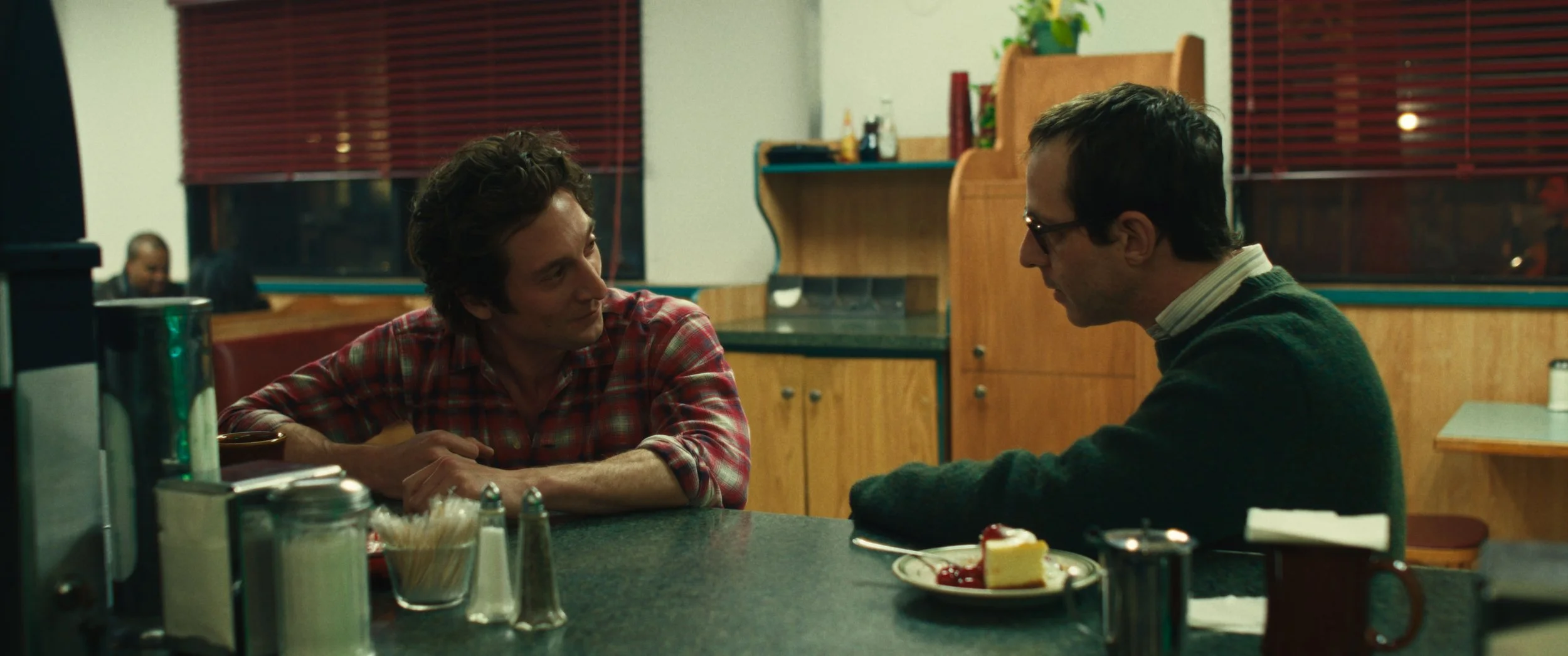Deliver Me From Nowhere review
Director: Scott Cooper
Writers: Scott Cooper (based on Deliver Me from Nowhere by Warren Zanes)
Stars: Jeremy Allen White, Jeremy Strong, Paul Walter Hauser, and Odessa Young
Running Time: 119 minutes
Please note there may be spoilers below
Sometimes when a particular filmmaker mysteriously amalgamates with a particular subject, the result is a lightning strike of such personal meaning to you that you can hardly believe you’re the only one who can see the light coming. In Springsteen: Deliver Me from Nowhere, it’s with the delicate beauty of blue-collar guilt and unspoken depression that Scott Copper paints a film so brimming with addictive humility and emotional introspection that it completely surpasses the hideously mundane insinuation that we’re due another droll rock-star biopic, one that might do the injustice of again playing the world’s largest violin for the world’s richest men.
In contrast to these fears, Cooper strips back the broad-stroke biopic to show only a narrow window of struggle in the life of a successful artist, one who’s thankfully not battling addiction, not leaving an angry wife and a crying child at home, not leaving behind him a wake of emotional debris for others to pick up, not on a path of entitled, narcissistic self-destruction. For Bruce Springsteen, his dark, internalised form of suffering was limited only to himself and his fear of hurting those around him, his inability to deal with commercial success in contrast to his humble New Jersey beginnings, and the scars left by his father’s alcohol fuelled abuse.
“Nebraska insists upon its existence for the very reason that it’s not asking you for your permission to do so.”
The artistic achievement produced during this window of struggle remains his best and most humble album, Nebraska, a stark and brooding work steeped in the distant echoes of tortured crooning and lyrics of tragic human flaws, and in the interest of full disclosure, I admit it is a work that means a great deal to me, to the point whereby playing a solitary second of Atlantic City on a movie soundtrack unfairly puts that movie in an advantageous position when it comes to playing with my emotions. Yet I’m not lost in bias when it comes to understanding the success Deliver Me from Nowhere achieves on the subject of writing against populism. If Nebraska is about anything, it’s about giving the world what it doesn’t want. Below the surface, Springsteen’s own mythology is that he wrote deeply introspective songs about murderers, crooked cops, and working class people finding reasons for hope, at a time when everyone in his life was telling him that doing so was a commercially suicidal choice. Nebraska insists upon its existence for the very reason that it’s not asking you for your permission to do so.
In the household I grew up in, Springsteen was a mandatory listening requirement. Against my will and later within my willingness, he became the primary score of living within my small home. During my first concert, I was carried home crying whilst the sounds of Springsteen and the E Street Band belted out their work at deafening volume behind me. I remember a bar in Dublin, which had so many people illegally crowded in for pre-concert drinks that the only way for me to escape the overwhelming claustrophobia was for my tiny frame to be lifted and surfed across the pub by strangers until I was dropped down at the fresh air of the front door. It’s worth mentioning that I have a complex relationship with my own father, one that also can feel steeped in the black and white starkness of Springsteen’s 1950s New Jersey and it’s rough, white door-frames. As the flashbacks of Springsteen’s youth come and go, I was buoyed by the choice of not punctuating his trauma in linear terms – instead, like memories, we get slices of his childhood at its most difficult, each just long enough to leave a mark but never all encompassing, never telling the whole story. The present always means more but the past keeps talking to him.
The strange parasocial connection I have to this story steeps me in partiality, but I can’t help but feel the opposite. I feel strongly enough about the tone, style, depiction of Nebraska’s creation that I’m likely to be harder on it than most, for passing this story off as disposable cinema isn’t enough for me to close the circle. For Cooper, it was vital he unapologetically leaned into the interior, the introversion that modern cinema so often avoids. The relief came early – after proving that Jeremy Allen White is not only capable of conviction but actually embodies Springsteen with stunning authenticity on stage, void of affectedness, we are then swiftly moved off stage to join him in his solitary home in Colt’s Neck, New Jersey, where for most of the story we’re reminded how silence, creativity, unresolved trauma, and success can mysteriously intermingle and steal the soul of a person who’s still trying to find answers amongst the mess. Upon seeing Springsteen admiring a car, a salesman adds, “I do know who you are.” Springsteen replies in the only way that seems fitting: “Well, that makes one of us.” He drives down state highways, heavy-footed, keen to turn off the radio lest he hears too much of one of his own songs.
“The very nature of dating an artist is to be left wanting more.”
As the legend goes, Terence Malick’s film Badlands inspired Nebraska significantly. It’s easy to understand why. Deliver Me From Nowhere depicts Springsteen seeing Badlands on TV, and the sight of Martin Sheen burning down Sissy Spacek’s childhood home is enough to lead Bruce on a research project on spree murderer Charles Starkweather, the real-life figure whose murders Malick used as inspiration for Badlands. Whilst the idea of showing a better movie (Badlands) within another movie is never a great idea, it certainly is an authentic way to remind us that inspiration doesn’t occur in isolation, that the simple act of metabolising great art is itself a precursor to creating great art. If Springsteen doesn’t consume the dark, brooding, xylophone-scored genius of Malick’s first movie, he understands less of himself. It’s Deliver Me From Nowhere’s dedication to remind us that cinema is, at it’s best, transcendent in helping us understand ourselves more. As he writes the lyrics for Nebraska, Springsteen quickly changes the pronouns to “I” because it’s his own darkness that he’s exorcising, through the lens of a man who shot eleven people.
But the creative process and personal exploration is not lacking joyfulness. Springsteen’s manager Jon Landau (Jeremy Strong) delicately manages his client’s declining mental health, encouraging him to capture his ideas on a 4-track cassette recorder. Jeremy Strong overworks the material slightly, his intensive method over-egging his Jon Landau into performative territory. When acting alongside the effortless David Krumholtz, you realise how unnatural Strong’s relentless instincts can be. Providing a light touch, Paul Walter Hauser’s Mike Batlan is a delight as he records Springsteen’s murder-laced songs before offering the funniest line of the piece, “Well, it’s definitely not Hungry Heart.” Hauser may be my favourite male actor working today, unable to stop himself from stealing each movie he’s never the lead of. Here, the buoyancy he adds to White’s morose creativity is essential for the movie to resist drowning in its own seriousness.
During this outpouring of haunting, working-class poetry, the film finds time for a fictional romance that humanises Springsteen’s sensitivities whilst also giving time for some required gender parity. Odessa Young glows as Faye, a single mother who meets Springsteen outside a local music venue, bubbling with streetwise intelligence and brave vulnerability. She knows a man of Springsteen’s personality type contains a prototypical selfishness, but she takes a risk with him to develop a connection, all the whilst he is incapable of letting her into his past or his future. Instead, she only gets the present moment: quiet walks across the Atlantic City boardwalk, flirtatious discussions of record collections, nighttime excursions inside locked up amusements. He’s a self-absorbed musician, of course, but regularly, the opportunity of authentic human connection is gifted to him by Faye, who’s smart enough to know the secret of being content is knowing yourself. They emotionally and physically connect, but she’s left unquestionably lost in the shadow of a depressed songwriter. The very nature of dating an artist is to be left wanting more. For Young, she’s an indisputable presence, deftly balancing the line between relationship possibilities and her own self-protection. To put it more ruthlessly – she calls Springsteen out on his bullshit and heroically displays her resilience, all for Springsteen to believe her assertion that his lack of commitment is driven by his animosity to emotional pain. An all too fitting flaw for a rock star.
There are indulgences. A studio performance of Born in the USA feels more of a contract requirement than a storytelling requirement, but it does help musically lift the roof amongst the acoustic picking. “It’s just two chords,” says Springsteen, still unable to appreciate his achievements. There’s the very linear sense of inevitability that biopics suffer from, the fact that most of us already know how this story will end. As the studio sessions play out, Springsteen’s frustration at not being able to recapture the magic of his bedroom demos can err on the side of over-dramatisation, but the sentiment still rallies – he’s not interested in the commercial whims of Columbia Records. It’s the opposition to Springsteen’s pop-culture rock ‘n’ roll image that ensures the material stands out. In Variety, Owen Gleiberman insists that the film is a bore because Nebraska is a bore, “whatever claims of greatness are made for the record, they have almost nothing to do with what people have loved about Bruce Springsteen for 50 years.” For Gleiberman, and I suspect many others, “Bruce, as an artist, radiates rock ‘n’ roll joy.” This may be the case, but there are plenty of movies celebrating at the altar of rock ‘n’ joy. The counter-pop idea of focusing on the introspective struggle of a depressed, self-isolating artist that’s seen as a statue of ‘joy’ is exactly the point. The reason Deliver Me From Nowhere stands out is because it doesn’t care if you think it’s dull. There are the only two chords, and there aren’t any others coming.
When Nebraska is, with great difficulty, mastered for release from its original demo tapes, Springsteen is adamant: “No singles, no tours, no press. We have to let this album breathe on its own.” To the suits who pay for vinyl printing, the release of the album is comparable to career suicide. “I don’t know who it’s for,” says record executive Al Teller. It’s curious to imagine how the modern world would completely ignore such a release outside of the 1980’s mono-culture.
By the time Springsteen escapes to LA, driving cross country in a state of escalating anxiety, the spectre of his father returns, thrusting him into a panic attack and taking him off his feet. Landau, at the mercy of his friend’s declining health, calls a psychiatrist to make an urgent house call. “Just hold on, Bruce.” In a way, it’s the ordinariness of Deliver Me From Nowhere that elevates it, the unadorned, unspecial, unglamorised, inhibited trauma that Springsteen refuses to release from his own head. Speaking about problems makes them real, and, as a famous celebrity, he’s become very skilled at diverting his attention from what’s real. The emotional release is not untypical to the common experience: the psychiatrist asks, “I want you to tell me as much or as little as you want,” and Springsteen replies with only silence as he thinks and thinks and thinks and then breaks down uncontrollably, Jeremy Allen White funneling years of repressed torment through his downtrodden eyes in a quiet boil that’s the most upsetting and profound acting moment of the year. Suddenly the film rises up and digs into the soft failures that humans too often falter to – an inability to express the truth.
The closing scene comprises of only a father and son, the film finding a fitting close to the lingering scars of parental misbehaviour. Douglas Springsteen (Stephen Graham in old-man make-up) mumbles on how he wasn’t always good, how he almost doesn’t deserve to have a successful son who can purchase him a house, give him money, and sit on his lap. He wasn’t always good. This is true. “But it’s done,” his son says. Depending on your personal experience, it’s very possible this moment feels superfluous in the story of a legacy artist who doesn’t need additional mythologising beyond the ‘joyful’ rock star, but on a rainy Sunday in late October, the unflinching depiction of forgiveness took the wind out of me, and it hasn’t yet come back.



